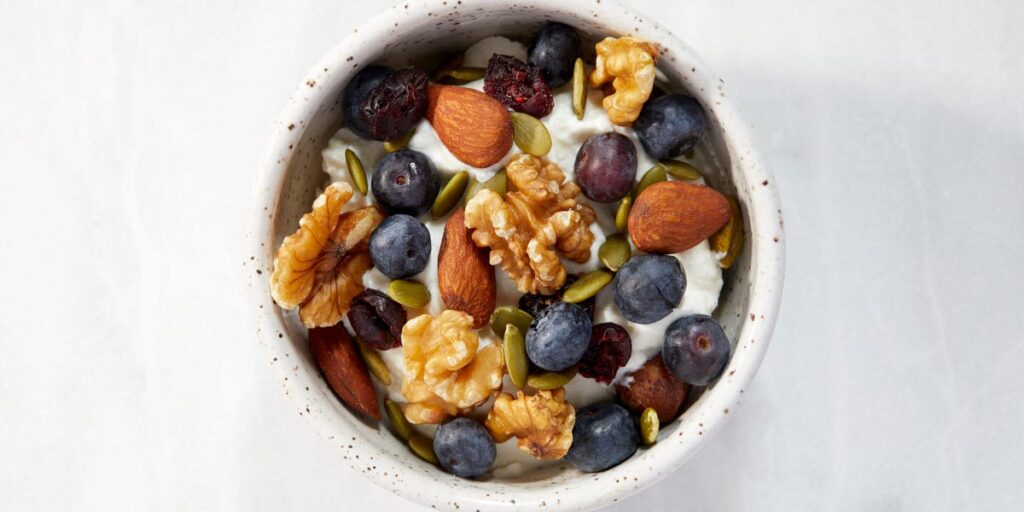If nutrition expert Stuart Phillips could pinpoint just one time in your day when you could amp up the protein, he suspects it might be at the breakfast table.
As one of the world’s leading experts on protein and a nutrition scientist who’s been studying this macronutrient for decades, he says the protein craze has gone a little overboard lately, with products like protein water and protein ice cream becoming trendy.
“Protein’s appearing in places where I don’t think it has any business,” Phillips, a professor of human physiology and nutrition science at McMaster University, recently told the Zoe nutrition podcast. “Nobody’s truly — in our societies — deficient in protein.”
Instead, he says, some people might be “just a little bit under what I think is the recommended intake” of protein — a problem that can be easily solved without adding any new pricey supplements or ultra-processed products to your day.
His own protein-rich go-to breakfast is cheap, sustaining, and flexible.
Greek yogurt has more protein and fewer carbs than regular yogurt
Phillips is part of a growing chorus of researchers and nutrition buffs who acknowledge that our current recommended dietary allowances of protein are a little bit low for most people.
“A meal where people — I don’t say under-consume protein — but that tends to be carbohydrate-heavy is breakfast,” he said.
For decades, our morning meals have been too often steered by ultraprocessed carbs like cereals, pancake mix, muffins, and toast.
“Carbohydrates and fats, they’re fuel,” he says, but “protein is the structural component of everything.”
For him, the easiest way to make breakfast a more protein-rich meal is to begin with a bed of yogurt, instead of bread.
“My superfood at breakfast is Greek-style yogurt,” he said. It’s a little higher in protein than regular yogurt, and pairs easily with other healthy, nutrient-rich breakfast staples. “Throw some nuts, throw some seeds, throw some fruit in there — it’s probably my go-to breakfast just about every day.”
If you have a cup of whole, plain Greek yogurt (20g) for breakfast, topped with a quarter cup of mixed nuts (5.5g), a teaspoon of chia seeds (1g), and half a cup of mixed berries (0.5g), that’s already about 27 grams of protein.
No matter who you are or what your muscle-building goals may be, you’re well on your way to meeting your daily requirements that way.
How much protein do you really need? A quick and dirty formula
Nutrition experts don’t quite agree on how much protein is too much, but Phillips says that many people have been overdoing it lately, overreacting to the idea that our recommended guidelines lowball us.
“The pendulum becomes ‘well we need to get protein because we’re not getting enough’ but that’s not the message,” he said. “Actually, a lot of people are getting more than enough.”
His current recommendation? Consume about 1 gram of protein per kilogram of your body weight each day.
If you know your weight in pounds, divide that number by 2.2 to find your rough protein target, in grams. For example, someone who weighs 150 lbs should consume around 68 grams of protein. Older people should strive to get a bit more, maybe around 1.2 grams per kilo of body weight, Phillips said.
Lots of influencers and wellness gurus are recommending way more than that. Dr. Peter Attia, a popular longevity physician, recommends more than double what Phillips does, at about 2.2 grams per kilo.
We’ve been through this charade with other macronutrients before. First, carbs were touted as the health foods of the 1980s and 90s, then fat had its heyday in the 2000s. Now, it’s protein’s turn to be the rockstar macronutrient.
Don’t get caught up in this hype cycle. Researchers generally agree that anything more than 1.6 grams of protein per kilogram each day is overkill.
“I do think that the benefits of protein probably stop a lot sooner than a lot of people are making out,” Phillips said.
Read the full article here


